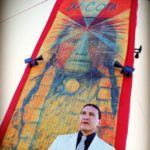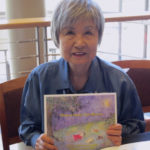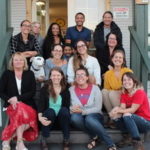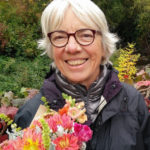 Chase Iron Eyes
Chase Iron Eyes
Peace House recognizes Lakota Sioux Chase Iron Eyes for helping to create and maintain a context for nonviolent resistance in North Dakota with his community at Standing Rock in the midst of brutal challenges to protect Lakota tribal lands and water from oil spill contamination for the Lakota people and for all of us into the future, while the paramilitary operation of TigerSwan organized a military assault on the Lakota on their legally owned tribal land.
Chase was unjustly criminalized (facing six years in prison) for his peaceful participation in the historic #NoDAPL struggle at Standing Rock, calling into question the trajectory of our global economic reality and economies dependent on fossil fuels. Thankfully, he is free.
The nonviolent resistance at Standing Rock, was organized to protect Native Lands and water from contamination by oil spills and from violations of the Treaty of 1896 between the Lakota Sioux Nation and the U.S. government.
Chase Iron Eyes was raised on the Standing Rock Indian Reservation until the age of 19. He earned his undergraduate degree at the University of North Dakota studying Political Science and Native American Studies. Chase then graduated from the University of Denver School of Law in 2007 and is licensed to practice law in South Dakota and in Federal Courts in North and South Dakota.
Chase took part in founding the #NativeLivesMatter movement. His organization documented the disparities in police killings, contact, etc. after Allen Locke was murdered by Rapid City police 1 day after attending a #NativeLivesMatter rally.
He has founded the media source Last Real Indians as a spiritual brain trust for the evolution of Original National thought while the mission has blossomed to include front-line activism, bridge-building to other struggles, nonprofit youth empowerment work on native lands. See www.LastRealIndians.com
 Hideko Tamura Snider
Hideko Tamura Snider
Hideko Tamura Snider was a child of ten in Hiroshima when the city was destroyed by an atom bomb at the end of WWII. She survived with injuries and was ill for some time. Her mother did not survive.
A retired psychotherapist, she has worked in private practice and as a licensed clinical social worker in the Radiation Oncology Department at the University of Chicago Hospitals and identifies deeply with those who are dealing with pain from radiation treatments as well as those who have experienced the trauma of war.
Since 1979, Hideko Tamura Snider has been appearing before professional organizations, university classes, and community groups across the United States and in her native Japan, telling her story and encouraging people of all cultures and nations to examine the consequences of the use of nuclear weapons and to work toward peace and nuclear nonproliferation. She is a living witness to the challenges of peace, to the terrifying consequences of the alternative, and to lessons we have learned from Hiroshima since the war.
A quest for the true meaning of life and humanity began early for Hideko, poignantly chronicled in her book One Sunny Day, published in 1996.
She is the author of a memoir, One Sunny Day, an eloquent and moving narrative of the devastating experience of the nuclear bombing. Hideko recalls her life before the bomb, the explosion itself, and influence of that trauma upon her subsequent life in Japan and the United States. Her years in America have given her unusual insights into the relationship between Japanese and American cultures and the impact of Hiroshima on our lives. She is also the author of When a Peace Tree Blooms
In 2006, Hideko inspired and organized thirty-eight members of the Rogue Valley Peace Choir’s Peace Journey to Japan. This was a remarkable event for the Japanese as well as those who went on the trip to sing at the Peace Park for the sixtieth anniversary of the Hiroshima bombing at the end of WWII.
In 2010, she awarded honorary doctorate in Humane Letters from the College of Wooster, citing her contributions through publications, a lifetime of human services in private and public sectors, and an active speaking schedule addressing issues of “survival, hope and grace in the face of nuclear war“. In 2014 Hideko was named Peace Ambassador of Hiroshima.
Hideko is currently involved in a worldwide project called “Green Legacy Hiroshima,” which send seeds and saplings all over the world from trees that survived the bombing of her home town, and are given as symbols of peace and hope, valuing planetary life.
 Shaun Franks (shown with wife Erica in photo)
Shaun Franks (shown with wife Erica in photo)
Peace House honors Peacemaker Awardee Shaun Franks in part, for his commitment to Peace House as both board and staff, and now in an advisory role. Shaun has given generously of his time to Peace House as we ventured through periods of both growth and transition. His engagement in collaborative leadership, eagerness to serve, along with his belief in peace and justice made him an obvious choice. Beyond our recognition of his commitment to Peace House, we honor his bold vision and enduring action for a sustainable future.
He led the establishment of the SOU Green Fund to invest student dollars into local energy, water, and campus sustainability projects. The fund generates over $150,000 a year and continues to provide resources for student vision to this day, generating over 1 million dollars to date. Student-initiated solar installations have generated billions of dollars in offsets, restoring water to a nearby stream in the Klamath, creating a bike program on campus, the SOU Farm and the Center for Sustainability.
He is a founder and board member of Rogue Climate, serves on Oregon’s solar industry policy committee, and is the chair for the MRG (McKenzie River Gathering) Foundation grant making committee. Most recently, Shaun was also recently appointed by the Governor to join the SOU Board of Trustees.
Thanks to the support of the community, Shaun now works for True South Solar as Inside Sales & Marketing Manager; living his dream of installing solar and continuously striving to be a better husband, father and community member. Shaun lives in Ashland with his wife Erica and two wonderful sons, Carter and Micah.
 Rogue Climate team and actions
Rogue Climate team and actions
In 2013, a group of millenials came together to found Rogue Climate, a grassroots movement to build a greater sense of urgency for action on climate change.
Rogue Climate volunteers and staff are motivated by the tremendous threat climate change poses to future generations. They believe that young people, rural communities, low-income households, and communities of color must play a major role in shaping a faster and more equitable transition to clean energy jobs and energy conservation.
In the past five years, Rogue Climate has prioritized helping young people develop the skills and experience necessary to be the next generation of climate leaders.
The group has helped Rogue Valley communities to adopt Clean Energy and Climate Action plans to help residents, businesses, and local governments to set goals and
adopt practical solutions to transition to clean energy. As a result of the work of Rogue Climate and countless volunteers, the City of Talent committed to transitioning to 100% clean energy, and the City of Ashland passed the second legally binding climate ordinance in the country.
The Rogue Climate team has also played a lead organizing role in Oregon to stop new fossil fuel infrastructure like the proposed Jordan Cove LNG export terminal and the Pacific Connector fracked gas pipeline which would be the largest climate polluter in the state of Oregon if built. Most recently, Rogue Climate worked with partners across the region to secure over 42,000 comments to the Oregon Department of Environmental Quality to protect clean water in our region by denying permits for Jordan Cove.
At a time when giant corporations and their political allies are working hard to “divide and conquer,” Rogue Climate has brought together a unique coalition of landowners from across the political spectrum, Tribes and indigenous communities from across the region, small businesses, health professionals, environmental and climate action advocates, local elected officials, and others to oppose the huge backward step that Jordan Cove represents.
We honor the many volunteers who make Rogue Climate’s work possible, along with the current staff, board and youth leaders. Rogue Climate is based out of Jackson County, and we are honored to continue to work for climate justice on the traditional tribal territories of the Shasta, Takelma and Klamath peoples.

Joanna Niemann served the Rogue Valley Community as someone who was willing to go into the eye of the storm in conflict situations and, as best she could, be a facilitator for conflict resolution. She believed deeply in applying communication tools for peacemaking. There was a lot of learning for those who participated with her in this endeavor.
Joanna Niemann grew up in the mid-west and studied art education at Concordia College in Morehead, MN. She taught art at various schools including Milwaukie, Detroit and Newark. In her forties she received an MA in architecture from the university of Colorado at Denver and worked as an architect in Hartford, CT. She loved colors and her work as an artist and crafts person was all about colors.
In the 1990s, she began her studies of Marshal Rosenberg’s Non-Violent Communication (NVC). This communications tool and Restorative Circles, an extension of NVC, informed the last part of her life. She facilitated study groups in NCV and RC, as she continued to study the material and organized workshops until her recent and untimely death.


